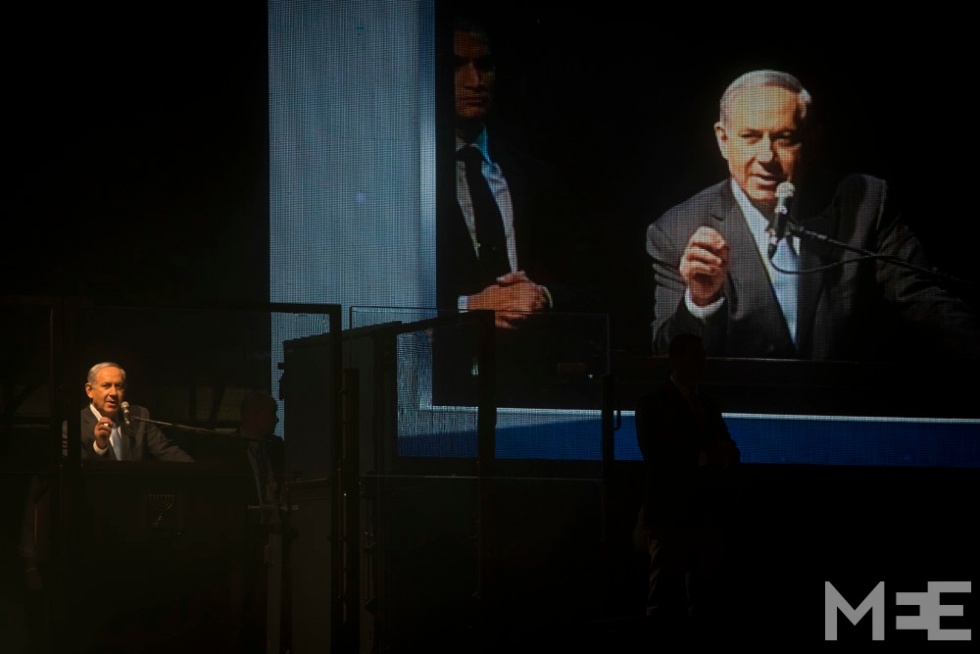Netanyahu: no Palestinian state if re-elected

Israeli Prime Minister Benjamin Netanyahu on Monday ruled out the establishment of a Palestinian state if he is re-elected, on the eve of a snap general election.
In one of a series of media interviews ahead of Tuesday's vote, Netanyahu was asked by the right-wing NRG website if it was true that there would be no Palestinian state established if he was re-elected as premier.
He answered: "Indeed."
“I think that anyone who moves to establish a Palestinian state and evacuate territory gives territory away to radical Islamist attacks against Israel,” Netanyahu told NRG. “The left has buried its head in the sand time after time and ignores this, but we are realistic and understand.”
Israeli daily Haaretz said the comments were “a last-minute attempt to pull right-wing voters away from Habayit Hayehudi (The Jewish Home),” a political party representing religious right-wing and settler voters.
In another interview with Israel's public radio, he was tackled on the same subject and asked whether his 2009 Bar Ilan speech - in which he endorsed for the first time the idea of the two-state solution - was no longer relevant.
"You can't carry out the things that were laid out in the Bar Ilan speech... when all you have on the other side is terror. There are no forces for peace, no partner for peace," he said, arguing that the current reality was no longer conducive to the creation of a Palestinian state.
"This speech was given before the Arab storm - the so-called Arab Spring - which has overwhelmed the Middle East bringing with it radical Islam. Any territory which would be handed over would be taken over by radical Islamists," he said.
"So certainly, reality has changed, and those who don't take that into account are likely to repeat serious mistakes."
On Monday Netanyahu went on a whistle-stop tour of Har Homa, a settlement neighbourhood in annexed East Jerusalem, and said he would not allow Palestinians to establish a capital in the city’s eastern sector and pledged to build “thousands” of new settlement homes.
“I won’t let that happen,” he said, referring to whether east Jerusalem could become capital of a future Palestinian state. “My friends and I in Likud (the ruling political party) will preserve the unity of Jerusalem.”
“We will continue to build in Jerusalem, we will add thousands of housing units, and in the face of all the “international” pressure, we will persist and continue to develop our eternal capital.”
Israel seized east Jerusalem in the 1967 Six-Day War and later annexed it in a move never recognised by the international community.
With Netanyahu's Likud party trailing the centre-left Zionist Union in the last opinion polls before the vote, the Israeli leader has ramped up the rhetoric against its leaders Isaac "Bougie" Herzog and Tzipi Livni, warning that a vote for them would endanger Israel's security.
"If Tzipi and Bougie set up the next government, Hamastan 2 will be established on these hills here," he said, pointing to the surrounding landscape in east Jerusalem.
"Hamastan" is a derogatory term used by Israeli politicians to refer to the Gaza Strip, governed by Hamas since 2007, after the Palestinian resistance movement won popular elections the previous year.
"We are preventing it [Hamastan 2] by developing prestigious neighbourhoods here for tens of thousands of Israelis," he said.
"They [the Zionist Union] will give in [...] and the meaning of this is that we won't be able to preserve Israel's security, and the terror that worked against us before will fire missiles at us from these hills."
Middle East Eye propose une couverture et une analyse indépendantes et incomparables du Moyen-Orient, de l’Afrique du Nord et d’autres régions du monde. Pour en savoir plus sur la reprise de ce contenu et les frais qui s’appliquent, veuillez remplir ce formulaire [en anglais]. Pour en savoir plus sur MEE, cliquez ici [en anglais].




